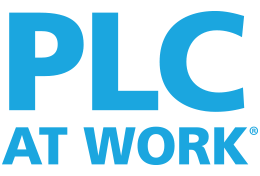DEMOGRAPHICS
Hot Springs Junior Academy is a part of the Hot Springs School District, a variety of campuses spread across multiple historic school sites, comprised of a diverse and driven student population and located in the thriving Hot Springs community, according to their website. The school’s mission is to ensure high levels of learning for all students to compete in a global society.
- 837 students
- 100% free or reduced lunch
- 17% English learners
- 19% special needs
Hot Springs Junior Academy's CHALLENGE
Hot Springs Junior Academy (HSJA), led by Principal William Brazle, embarked on its journey with the Professional Learning Communities (PLC) at Work® process in 2020. The school was in Cohort 4 of the PLC at Work Project through Solution Tree’s partnership with the Arkansas Department of Education.
Prior to joining the cohort and implementing the PLC at Work process, teachers at HSJA primarily worked in isolation, lacking a clear connection to a shared mission and vision, according to Principal Brazle. Additionally, the existing curriculum didn’t consistently provide all students access to grade-level instruction, focusing mainly on addressing missing foundational skills.
This lack of cohesion was evident in the variations between grade-level English and math teams, for example. While teams existed, their approaches and priorities varied widely. One grade might excel in formative assessments, while another focused on data analysis, creating a fragmented and inconsistent learning experience for students.
When Principal Brazle came to the school in 2021, HSJA was in its second year of the PLC process, and its primary need was to get teachers on the same page. This required creating a process to align team efforts and ensure consistency across grade levels and subjects. The journey toward this goal began with the recognition that a unified approach was essential to achieving their desired outcomes.
“Our teachers are changing our community here every day. They are ensuring that students are learning what is essential. We don’t want them to just be successful seventh-, eighth-, and ninth-grade students; we want them to be successful human beings. And that’s what our teachers strive to do every day.”
IMPLEMENTATION
Principal Brazle and the HSJA team took a proactive and multifaceted approach to implementing the PLC at Work process, ensuring all teachers followed the same approach to instruction.
Recognizing the need for alignment, Brazle prioritized creating a unified system. He connected with Brig Leane, a consultant with over 20 years of experience in education as a teacher, assistant principal, and principal in a variety of settings. Together, they began with standardizing practices across grade levels and departments.
HSJA developed a guiding coalition to help lead the process and keep the work focused on the four critical questions of a PLC. Teachers began transitioning from working in isolation to working within teacher teams. Teacher teams also determined essential standards and built a guaranteed and viable curriculum to ensure high levels of learning for all students.
Brazle then restructured HSJA’s master schedule to allow for dedicated department meetings, fostering collaboration and vertical alignment.
The introduction of their essential skill planner—a comprehensive unit plan template—streamlined planning and ensured that all teachers addressed key elements of instruction, from essential standards and CFAs to interventions and extensions, fostering consistency and effectiveness across the seventh- to ninth-grade classrooms.
Brazle also prioritized professional development, leveraging the Marzano High Reliability Schools process to build a common language and approach to teaching.
Through these intentional steps, Brazle guided HSJA toward a cohesive and collaborative PLC culture. By providing structures, tools, and professional learning opportunities, he empowered teachers to work together effectively, ensuring all students received high-quality, aligned instruction.
RESULTS
The overall dedication to continuous improvement and the successful implementation of the PLC process at Hot Springs Junior Academy led to remarkable achievements. The school has seen increases across English language arts and math.
In its fourth year, the school gained recognition as a Model PLC at Work® school, a testament to its commitment to collaborative, data-driven practices that foster student success. This achievement was further underscored by the school’s district recognizing HSJA teachers as Teacher of the Year for two consecutive years, showcasing the positive impact of the PLC process on educator effectiveness. Kate Neighbors, an English teacher, earned the title for the 2021–2022 school year, and Kyle Stevens, a social studies teacher, earned the title for the 2023 school year.
The school’s focus on data-driven decision making also yielded tangible results in student performance. By targeting a schoolwide focus on writing and implementing consistent rubrics and targeted instruction, HSJA saw significant improvements in student writing across all subjects. These successes culminated in HSJA achieving High Reliability Schools Levels 1, 2, and 3, demonstrating its dedication to creating a high-performing learning environment where all students can thrive.
A positive culture shift in teachers and students was another result of the hard work and dedication of HSJA.
Students now have a more positive attitude and higher engagement in the classroom. Teachers at HSJA no longer follow a teach, test, and move-on approach. Instead, HSJA has adopted a system that prioritizes mastery learning and student support. Students no longer fear failure; they understand that if they don’t grasp a concept initially, they will receive targeted reteaching and support. This shift has alleviated test anxiety and fostered a growth mindset among students. They now view assessments as opportunities for growth rather than definitive judgments of their abilities.
Principal Brazle believes this cultural shift has been instrumental in creating a more positive and empowering learning environment where students feel supported and motivated to succeed.
Growth Score for All Students 2020–2023
Students Reading at Grade Level

Student Engagement

WHY PLC AT WORK®?
Professional learning communities (PLCs) are schools that empower educators to work collaboratively in recurring cycles of collective inquiry and action research to achieve better results for the students they serve.


